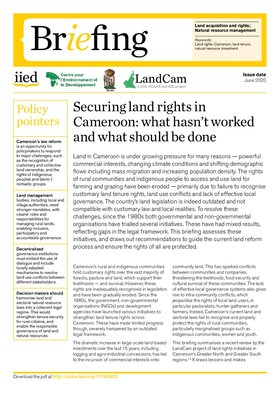Compensation for Expropriated Community Farmland in Nigeria: An In-Depth Analysis of the Laws and Practices Related to Land Expropriation for the Lekki Free Trade Zone in Lagos
In Nigeria, the recurring impoverishment and other negative socioeconomic impacts endured by landholders affected by expropriation are well-documented and call into question the Land Use Act's (LUA) effectiveness in protecting local land rights. The World Bank's Land Governance Assessment Framework found that, in Nigeria, "a large number of acquisitions occurs without prompt and adequate compensation, thus leaving those losing land worse off, with no mechanism for independent appeal even though the land is often not utilized for a public purpose".



